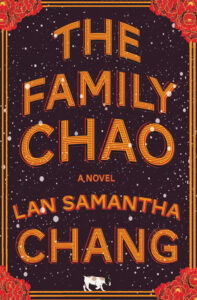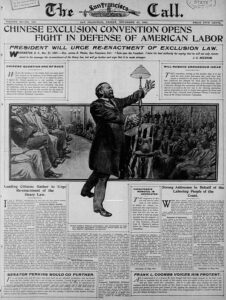
The Chinese-American family restaurant as a microcosm of the clash between Chinese and Western cultural values (Haven, Wisconsin, present-day): A compelling reason to read really good fiction is to enlighten us about cultures different than our own. Which makes Lan Samantha Chang’s stirring and thought-provoking new novel The Family Chao a must read.
Using a Chinese-Americanized family run restaurant as the focal point for expanding our understanding of the differences between Eastern and Western cultural values is a brilliant concept, brilliantly rendered.
Razor-sharp, cynical, non-stop intense, it’s easy to see why Chang is the “first woman and first Asian woman” to lead America’s most prestigious and oldest creative writing program, the Iowa Writing Workshops.
“The story of Chinese-American cuisine is “one of the most extraordinary ones of hardship, adaptation, and entrepreneurship,” says Peter Kim, Executive Director of the Museum of Food and Drink in Brooklyn, NY in the video below:
The Fine Chao Chinese-American restaurant, located in one of the heartland states (Wisconsin) where the author is from, tells a similar story of “working inhumane hours,” and adapting Chinese specialties to American tastes by entrepreneurs who immigrated to America for a better life (“life strategy”). Leo Chao and Winnie have been running the neighborhood restaurant for thirty-five years, serving an “enclave” of Chinese immigrants and all who love “good food.” Except: dictatorial Big Chao with a grab-what-you-can-and-desire mentality, which Chang wonderfully expresses as “graspingness,” treated his wife as a servant until one day she flees. When we meet her she’s already living at the Spiritual House seeking Tranquility, escaping a “shouting house” sorely lacking peacefulness.
It’ll become clear that two of their three sons have also not adapted contentedly: Dagou in Mandarin (William in English), the eldest at thirty-three, failed to make it big in the Big Apple so for the past six years he’s been helping run the restaurant. Obsessed with proving to his cruel father that his culinary skills exceed the promise Leo made to split the business 50/50 should he triumph, he’s a bundle of “hectic insanity.”
Ming, the middle son, also left for New York but he’s the “accomplished one” measured by money. Money viewed by both brothers as setting them free. Ming, though, believes his greatest accomplishment is “detaching from the family.” As the son subjected to haunting bullying since middle school, he’s the most angst-ridden. As the most intellectual, it’s his cultural analysis and philosophical voice, sadly poetic, that penetrates the most. “Lost home, lost country, lost years, lost ancestors, lost memories, lost hopes, lost lives.”
James, the youngest, is the “good son” who has adapted best. Naïve, a freshman at college living away from home, he’s yet to appreciate the depth of the psychological damage on his brothers and mother, paining us when he asks, “Why did she leave us?” He can’t get over how Ming has managed to emotionally detach himself, likening him to a birder “hiding in the blind.” Instead, the reader can’t get over how James seems fairly normal.
Dagou takes up the most oxygen in the room and doesn’t hide his emotions spewing profanity. And yet it’s Ming who keeps it all in we also worry about.
A prophetic sentence on page four clues us in to trouble ahead when we’re told diners said the pleasing food was prepared by “bad people.” The setting is charged from the get-go so when we’re told on page 79 “there’s a sense of alteration in the air . . . something is about to happen,” it confirms what we’ve felt all along.
This complicated family mystery will keep you wondering through the end. Cleverly divided into Part I They See Themselves and Part II The World Sees Them, we see them vividly in dramatic scenes that feel as if we’ve dropped by for a delicious meal and invited to the kitchen where we’re eavesdroppers and voyeurs deciding whether the judgement wielded is fair and to what extent racism factored in. Swift, authentic dialogue adds to the fiction feeling very real.
Symbolism is everywhere. Starting with the Mandarin translation of the brothers’ names: Dagou means Big Dog; Ming, Second Dog; and James, Third Dog. The family has a dog, Alf, constantly running away. Dogs are everywhere at the Spiritual House, where they’re symbols of Luck. Dogs represent loyalty and devotion to humans when they’re treated well. In this sense, they convey the Chinese cultural value of honoring and obeying ones parents. Dogs also convey an “our mine” ownership that suffocates humans, and sadly not all dogs are treated well. Which makes another Chinese meaning of Dagou – “to beat the dog” – awfully prophetic.
“Filial piety is arguably China’s most important moral tenet.” The Chinese written word for familial loyalty is 孝. The novel raises questions as to when filial duty crosses the line into exploitation. How far should a family go when faced with the oppression of a cruel, out-of-bounds father?
To make sure we see the brothers as distinct individuals rather than generic stereotypes, Chang reminds us of a popular children’s picture book, The Five Brothers, published in 1938 in which all the brothers look alike and have “freakish abilities.” To think the book is considered a classic, ingraining Chinese stereotypes so early in childhood should make us cringe.

Should because the surge in anti-Chinese discrimination and hate crimes has risen alarmingly, but systemic racism in America towards Chinese immigrants goes far back to the passage of the Chinese Exclusion Act in 1882 that lasted until 1943.
The tragic irony of the “Western catalogue of dehumanizations” towards Chinese-Americans is reflected at the Spiritual House. A serene oasis created from a non-descript place by Buddhist nuns, whose religion seeks attainment of wisdom and compassion. They also believe in the Confucian philosophy of moral ideals for individuals and society at large. Winnie has “double spirituality” because she’s both a “devout Christian” and a “devout Buddhist.” A devotee of the teachings of the “head nun,” Gu Ling Zhu Chi, elderly so rarely seen. We see her when the brothers visit their mother. A reader of ancient I Ching cards and palms, she makes a prophecy for Dagou he should have embraced.
The novel’s release on February 1 is also meaningful. The date is the Chinese Lunar New Year. Another important day matching the story’s timeline is Christmas Day, the busiest time of the year for Chinese-American restaurants. The novel opens a few days before with Ming and James traveling home, separately, for Dagou’s The Greatest Christmas Party Ever! he’s passionately planning that year to dazzle Leo. Frenzied, bordering on madness, Dagou has gone extravagantly overboard, spending a fortune. Money he doesn’t have. Where does it come from?
Much more is going on between the family and characters outside of it. Many involve relationships with young women, white and Chinese-American, adding another perspective to view cultural identity and cultural values. An older Chinese orphan who’s been working in the kitchen for a long time ups the suspense as no one knows anything about her since she speaks an unintelligible form of Mandarin. Ming is drawn to her as he’s the only one who knows Mandarin.
Dagou has invited a slew of people to his Christmas gala. Stop by because something is definitely about to happen.
Lorraine